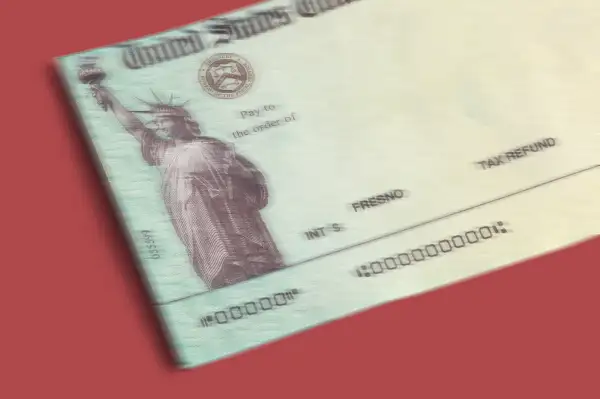The IRS Is Still Seeing a 'Record Number' of Stimulus Check Scams

To the millions of people with three rounds of Economic Impact Payments under their belt, stimulus checks may seem like a relic of the early pandemic — like dalgona coffee or baking bread.
But not, apparently, to fraudsters.
The IRS revealed this week that it got "a record number of reports" about stimulus check scams in June and July. Amid curiosity around whether there will be a fourth stimulus check, scam attempts are reaching "levels we haven't seen in more than a decade," as Jim Lee, chief of IRS Criminal Investigation, said in a news release.
Many of the scam attempts came via text messages and phishing emails, both of which pushed consumers to click on links to claim their payments. A sample email provided by the IRS had the subject line "Notification : For security reasons, please re-enter the correct banking data previously provided to the IRS." An example scam text began with "Congrats, we are pleased to inform you that your information was pick up for COVID-19 stimulus payment from the Federal Government by JOE BIDEN."
COVID-19 scams aren't a new problem. For the past year and a half, criminals have conned people out of their money and data by using billboards, Facebook, Zoom, job listings, robocalls and more. Thieves started out selling herbal supplements that supposedly cured the coronavirus, evolved into hawking fake vaccine appointments and are now targeting families' advance child tax credit payments.
The Federal Trade Commission received roughly 360,000 fraud reports between Jan. 1, 2020, and this past Wednesday resulting in a loss of nearly $548 million. The vast majority involved online shopping and travel, but some 12,000 — or $15.8 million worth — were linked to government imposters.
"When money from the government is in the news, we know scammers are about to run their standard playbook," FTC consumer education specialist Lisa Lake wrote in a June blog post.
How to know if that stimulus check text/email is a scam
First of all, you should know that the IRS is mostly a mail-based operation: It does not randomly reach out via email, text or social media to ask people for their personal information. In fact, the IRS generally doesn't even call taxpayers on the phone.
If the message contains a threat, asks for a gift card or requests cryptocurrency, it's definitely not from the IRS. (Jail time for tax evasion is extremely rare.) Another red flag is if it has glaring grammar or spelling errors. (Notice the weird phrasing and capitalization in that scam text above.)
If you receive an IRS message that you suspect is fishy, contact the agency to report it here.
What to do if you still haven't gotten a stimulus check
You might have your defenses down and be more susceptible to a scam if you're missing any of the stimulus checks.
To recap: Congress has approved three rounds of Economic Impact Payments in connection with the COVID-19 pandemic. The bulk of these payments were sent out via direct deposit in March 2020 (maximum amount $1,200 per person), late December 2020/early January 2021 (max $600) and March 2021 (max $1,400). Federal lawmakers aren't really talking about issuing a fourth stimulus check at this time, though some states have taken up the cause on an individual basis.
The IRS is also sending out what it's calling "plus-up payments" to people whose 2020 tax returns indicated they were owed more stimulus money than the IRS initially calculated. These may seem like a fourth stimulus check, but they're not.
If you're missing the first or second stimulus check, you should have claimed the Recovery Rebate Credit on your 2020 tax return.
If you're missing the third stimulus check, consider using the IRS Get My Payment tool to see whether your money was sent. If it was, and you think the funds were lost or stolen, you can request a payment trace. And if all else fails, you can claim the Recovery Rebate Credit when you file your 2021 taxes next year.
Just don't give your personal information to anyone suspicious in the meantime.
More from Money:
How to Spot a Stimulus Check Scam
7 Stimulus Check Myths, Debunked
8 Major Stimulus Check Problems and What You Can Do About Them
